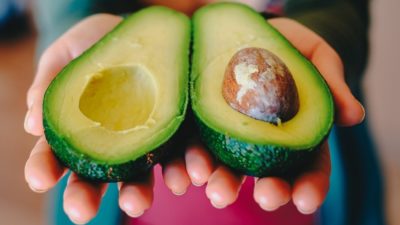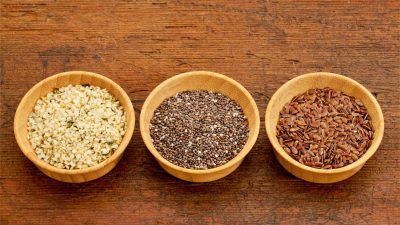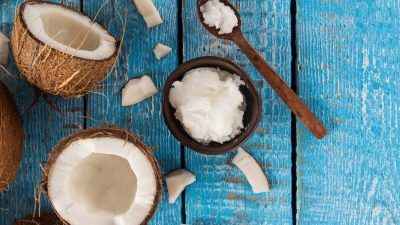Oils

We love them and we loathe them – so here’s all you need to know about oils
Fats in oils
Oils are extracted from oily seeds and fruits such as olives or coconuts and are mainly composed of different fats, but they also contain small amounts of other nutrients, such as vitamin E or antioxidants but that depends on the type of oil.
Fats are essential building blocks of cell membranes and brain tissue plus they help the body absorb fat-soluble vitamins (A, D, E and K), provide energy and insulation. Of all the nutrients, fats are the richest source of energy and we really do need only small amounts. But… fats make things taste good so it’s easy to eat too much and most of us need to watch our fat intake.
Some fat is healthy and necessary, while other fat is unhealthy and unnecessary. There are three types of fat found in oils:
1. Saturated fats – these are not necessary in the diet because our bodies can make them. Eating too much saturated fat can raise your blood cholesterol levels and so increase your risk of heart disease, stroke, obesity, type 2 diabetes and some types of cancer.
2. Monounsaturated fats – not essential but not harmful. Probably the most common one is oleic acid, an omega-9 fat that’s the main component of olive, macadamia and avocado oil. They are only unhealthy if they replace polyunsaturated fats in your diet.
3. Polyunsaturated fats – these are the essential omega-3 and omega-6 fats which must be in our diet. It’s easy to get all the omega-6 fats you need from plants but omega-3s are trickier. Rich sources are flaxseed, hempseed, chia seeds, walnuts and rapeseed.
Rapeseed oil
Rapeseed oil has the healthiest fat ratio among cooking oils as it’s very low in saturated fats and high in unsaturated fats. It is a rich source of essential omega-3s and also omega-9 fats. It’s this latter fat that helps it withstand higher temperatures – with smoke point around 230° – so it’s ideal for cooking,
One and a half tablespoons of rapeseed oil provide a daily dose of omega-3s, a substantial amount of vitamin E and phytosterols – natural compounds known for their cholesterol-lowering properties.
Choose cold-pressed rapeseed oil when possible as it’s more nutritious than cheap ‘vegetable’ oil, produced using heat and solvents. However, both versions provide omega-3s and have a very subtle flavour so make the perfect universal culinary oil.
Olive oil
Olive oil is mostly made up of the monounsaturated omega-9 fat, oleic acid, and is rich in heart-healthy phytosterols and polyphenols. The latter are antioxidant and anti-inflammatory compounds that help to protect your blood vessels and other tissues from damage. However, only virgin olive oil contains high enough amounts to boost your health. According to research, it may help to lower your blood pressure and cholesterol levels.
Extra virgin olive oil is cold-pressed from olives, has the most distinctive flavour and strongest health benefits. Virgin olive oil is made in the same way but from slightly riper olives, giving it a lighter flavour but still retaining all the nutrients. Extra virgin and virgin olive oils are best used cold because heat destroys a fair amount of their beneficial compounds.
If the label simply says ‘olive oil’ or ‘pure olive oil’, it means it’s a mixture of virgin and refined olive oils, which have much less flavour and lack many of the health-supporting nutrients. On the other hand, they are more temperature stable and are good for cooking – their smoke point is around 230° as opposed to 160° for extra virgin olive oils.
Sunflower oil
Sunflower oil is rich in vitamin E, an important antioxidant that protects your tissues from damage and keeps your skin healthy. It is, however, high in omega-6 fats and although we need some, it’s easy to get too much and they can block the absorption of healthier omega-3s.
Because of its high omega-6 content, sunflower oil has a low smoke point – it starts burning sooner than other oils and this creates unhealthy by-products. There’s also high-oleic sunflower oil which, as the name suggests, is high in the omega-9 fat, oleic acid. That raises its smoke point but it’s still not that healthy so you’re better off using a different cooking oil! However, munching on sunflower seeds is a good way to top up your vitamin E intake.
Coconut oil
Most vegetable oils contain less than 16 per cent saturated fat whilst coconut oil contains a whopping 86 per cent, which is what makes it solid at room temperature. Some people claim that the saturated fats in coconut oil are different to other saturated fats but research shows there’s almost no difference in long-term health outcomes.
If you use only small amounts in cooking, it probably won’t cause any harm but using large amounts, adding it to drinks or using it instead of butter is not healthy. All the sensational stories about coconut oil being ‘special’ and curing diseases are nothing more than marketing.
While coconut oil isn’t great for our insides, it can work wonders on the outside – it helps skin to heal and nourishes hair.
Sesame oil
Sesame oil is very low in saturated fat and high in unsaturated fats – omega-6 and omega-9. It’s good for you and healthy if you use it sparingly but too much can sway your fat intake in the wrong direction in the same way as sunflower oil – reducing the absorption of omega-3 fats.
A big advantage of sesame oil is its high smoke point, meaning it doesn’t degrade easily when you use it for cooking. It also has a great flavour and these two qualities make it an excellent choice for stir-fries in small quantities.
A word on oils
As a general rule, we should use only small amounts of oil – one tablespoon per portion is more than enough. The best oils for cooking are rapeseed, sesame and olive oil, while virgin olive oil is best for cold foods. To top up your omega-3 intake, have a teaspoon of flaxseed oil daily and you’ll be rewarded by good health.







